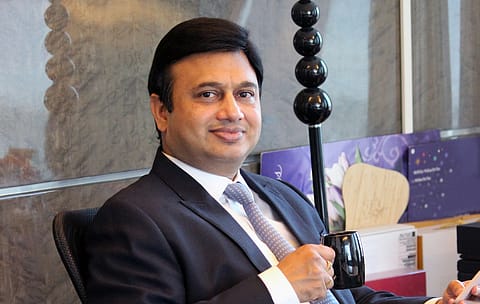Wonderchef bets on quality in price conscious India
The company, co-owned by celebrity chef Sanjeev Kapoor and entrepreneur Ravi Saxena, looks at the quality conscious customer in the thriving pricey consumer durables market as the target audience.

In a fiercely price conscious market, it’s rare to see someone focus on quality with little regard for pricing. If consumer durable companies in India are increasingly driving down the price to attract the price-sensitive customer, Wonderchef walks a less-trodden path. The premium kitchen appliances company, co-owned by celebrity chef Sanjeev Kapoor and entrepreneur Ravi Saxena, is trying to focus on the premium- to the high-end market, keeping in mind the quality-conscious customer.
“There is no dearth of cheaper products in India. The race to the bottom is on. But for the quality conscious customer, there aren’t many options. Unfortunately, the high quality buyers are left out,” says Saxena, managing director, Wonderchef, referring to his target audience.
It didn’t take much time for Saxena to figure out the niche, but substantially huge market for high quality, expensive goods.
The entrepreneurial CEO and an alumnus of Indian Institute of Management, Ahmedabad and Indian Institute of Technology Delhi, Saxena knows he has only scratched the surface of a mammoth market. “The Wonderchef brand is only about six years old in India. The brand is made, people know the brand, and trust the brand. Now it’s a question of making it available everywhere through all possible channels,” he says.
At Wonderchef, they follow the German LFGB quality standards.
“India is still a price-conscious market. It needs to build the quality-conscious customer. For instance, you may get a simple pan made of recycled aluminium which is sold at a low rate. Most companies are using recycled aluminium because it is 20% cheaper. But the non-stick coating becomes unstable and the surface begins to deteriorate. We only use virgin aluminium for our production,” says Saxena.
The ₹300-crore company currently offers more than 600 stock-keeping units (SKUs) and has a strong omni-channel retail presence with more than 10,000 multi-brand outlets, 25 own outlets in India and three in Mauritius, and a direct-to-home network of 70,000 women, apart from a formidable e-commerce presence. Even during the pandemic, there was no looking back. The company registered sales of ₹121 crore during the last festive season, 50% higher than the corresponding period in the previous year. It is expected to post revenues of around ₹300 crore this year.
Recommended Stories
“Around 60% of our revenues come via stores. We are also focussing on e-commerce. The remaining 40% come through digital channels. We are available at all important channels like Amazon, Flipkart, Tata Cliq, Myntra, Snapdeal, Ajio, and Big Basket, among others. Around 30% of our digital revenues come through our own Wonderchef channel,” he says.
Saxena is busy trying to expand the distribution network. “Our target is to clock an annual turnover of ₹1,000 crore over the next four-five years,” he says, adding that Wonderchef has four warehouses at present, one each in Mumbai, Delhi, Kolkata, and Bengaluru.
Saxena, who has spent over 15 years as CEO and managing director of major multinational companies in India, has a long track record of launching new concepts and taking them to success. He is launching a high-profile line of products, called Crimson Edge, which will have an array of appliances including OTGs, egg boilers, juicers, sandwich grills, hand-mixers, toasters, and kettles. He wants to target the high-end customer with the high quality products.
“Generally, our products are 20% more expensive. The new collection, Crimson Edge, will be 40% more expensive,” he says.
(INR CR)
By May, he hopes to launch at least 10 products. Some will be manufactured in India while the remaining will be imported.
“At present, we have two manufacturing plants—one in Baddi, Himachal Pradesh, which makes nutri-blenders [with a capacity 75,000 nutri-blenders a month] and another one, a cookware plant at Bengaluru [with a capacity of 400,000 pans a month],” says Saxena. Headquartered in Mumbai, Wonderchef employs around 600 people, mostly in its two manufacturing plants.
He wants to empower women in India by enabling them to create their own business and cook healthy for their families.
Earlier, Wonderchef used to import a wide range of products. But now, nearly 85% of its products are produced locally. “Some products like kettles, toasters and hand-mixers are still not manufactured in India since the volumes do not justify the production. Hence, we import them from countries like Italy, Korea, and China.”
So far, Wonderchef has raised two rounds of funding of ₹50 crore and ₹60 crore from two investors. “We are not looking to raise any funds in the immediate future,” he says.
Having built a dozen distinct businesses from scratch in the services sector, he has expertise in launching businesses, growing them, and creating shareholder value. He is focussed on execution and is fond of leveraging technology for creating differentiators in the marketplace. He believes in a matrices-driven quality approach to bring most reliable services to clients, customers, and business partners. At present, Saxena runs his own business in retail and management education. He is the Indian partner of the prestigious Italian university, Bocconi, and has recently launched a top-end business school in Mumbai.
Saxena is also trying to expand the export markets for Wonderchef. “We export our products to seven-eight countries including the U.S., the U.K., Canada, Australia, and to the Middle East, primarily targeting the Indian diaspora. At present, our exports account for around 5%-7% of revenues. Our non-stick pans are very popular abroad.”